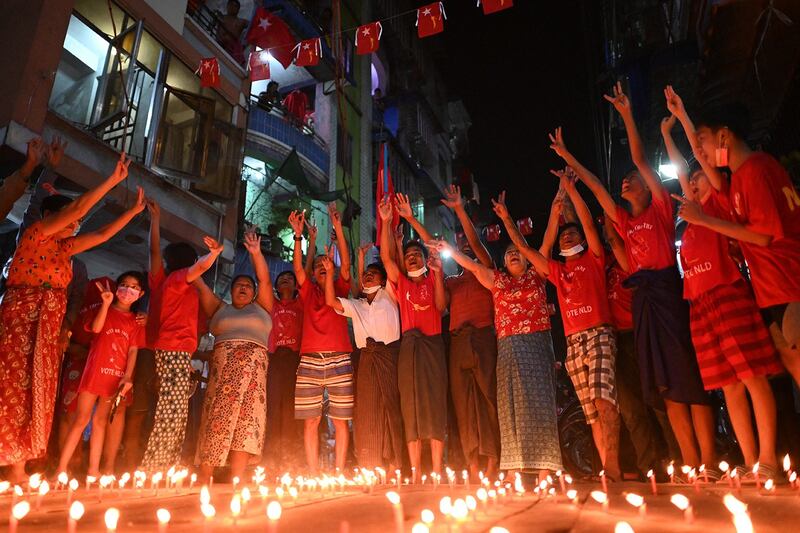Myanmar junta authorities have arrested and jailed nearly 1,500 people they say posted anti-junta messages on Facebook, TikTok and Telegram over the last two years, research group Data for Myanmar has found.
The arrests included a woman who had been working in Thailand and was sentenced to life in prison in December after she returned to Myanmar to have her passport and work visa renewed, a family friend told Radio Free Asia.
Officers checked her phone during the renewal in Yangon and found anti-junta messages that she had sent privately, the family friend said.
“After that, she was arrested and taken to the North Dagon jail,” the friend said. “Then she was sent to Insein Prison.”
The junta has struggled to gain popular support since taking power from a civilian government in a Feb. 1, 2021, coup d’etat.
Responding to critical messages with criminal prosecution has had a chilling effect on how people express themselves online. It has also earned Myanmar a ranking as the second worst country in the world for internet freedom, according to Washington-based Freedom House.
The Data for Myanmar report said that most of the 1,480 people detained between Feb. 29, 2022, and Jan. 30, 2024, were Facebook users.
The independent NGO also found that an average of 62 people were detained every month. Almost half of the detainees – nearly 700 people – were from the Yangon and Mandalay regions.
Data for Myanmar compiled data for the Jan. 31 report by monitoring junta-affiliated daily newspapers and news media.
Jailed for sharing news
Another social media-related arrest was that of Mandalay resident Khin Maung Chin, who was detained in December 2022 for sharing news articles and critiques of the military written by other Facebook users, a friend of his told RFA.
Khin Maung Chin was also found to have written messages about Aung San Suu Kyi, the head of the deposed National League for Democracy and the country’s former de facto leader.

And last November, junta troops raided the home of Yangon resident Min Nyo, who had worked to provide clothing and medicine to war victims.
A family member told RFA.that pro-military supporters had informed authorities about his online criticism of the junta. Min Nyo is also serving a sentence at Insein Prison, where many pro-democracy activists are held.
Freedom House noted in a report released in October that the junta has reduced broadband speeds, cut internet connections and blocked some text and calling services in areas where anti-regime resistance has been strong.
‘Procedure used by dictators’
Junta authorities have also restricted Burmese citizens from accessing social media platforms while junta-controlled publications frequently warn that people can be charged under the Penal Code and Telecommunications Law, the report said.
In December, the junta announced the formation of a committee to further monitor and take action against what people write and share online.
RFA’s attempts to reach junta spokesman Major Gen. Zaw Min Tun to ask about the Data for Myanmar report were unsuccessful.
However, junta officials have previously stated that the regime will take action if posted messages are aimed at inciting people to destroy the country’s peace and stability or to abolish the junta’s governing mechanism.
A former military officer told RFA that arresting people for critical comments is an understandable part of governing.
“As a ruler, he would arrest those who spoke ill of him,” he said. “This has become an obligation. It must be done. It is his job to arrest those who raised the rebellion.”
Aung Myo Min, the human rights minister for the shadow National Unity Government, criticized the arrests as merely a “procedure used by dictators to prevent people from speaking up” – not as a way to maintain stability.
Translated by Kalyar Lwin. Edited by Matt Reed and Malcolm Foster.
